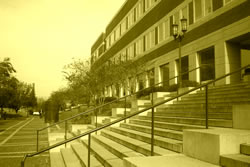April 12th: Simulation and Essence
Heidegger
Eco
Baudrillard
Leading Class Discussion
Let's have Kendra and Aishah come up and lead the class discussion on their respective authors.
After the presentations/discussions, don't let me go on until I address the end of semester stuff.
Heidegger's "The Question Concerning Technology"
Is he for real? Did he really lead us through a grueling intellectual exercise just to tell us the the essence of technology is ambiguous?!? He started out so clear. What happened? Also, why is he so obsessed with "correct" meanings of words?
We could spend lots of time nailing down the definitions of enframing, causes, revealing, challenging, and bringing forth, but, in the interest of time, we should focus on what allows us to talk about rhetoric. I think the following terms are important to consider:
- techne: method, ways of producing things; the word "technology" comes from it
- check out Heidegger's definition on p. 18: "bring[ing] forth truth into the spledor of radiant appearing"
- episteme: knowledge or science; you can read "epistemology" in it
- instrumentalism: the belief that tools (or sciences) are useful in carrying out (or explaining) goals (or ideas)
We should use our other texts to help us think about technology and it ambiguous essence. In fact, Derrida's differance allows us to consider the problem with defining technology's essence. Because technology is embedded with meaning, it can be read; it's rhetorical. Charles Bazerman defines "the rhetoric of technology" as:
"The rhetoric of technology shows how the objects of the built environment become part of our systems of goals, values and meaning, part of our articulated interests, struggles, and activities."
How can we think about the above quotation in light of Heidegger's point that modern technology is enmeshed in a system that demands resources "be immediately at hand" (p. 8)? He even tells us the man (and, presumably, woman) is "made subordinate to the orderability of" needed resources (p.8).
Eco's "Travels in Hyperreality"
Lots of discussion of American entertainment. Our obsession for the fake is quite appearant to Eco. Let's have a general discussion on this piece.
- What is the point about telling us we like fake stuff?
- In terms of rhetoric, why does knowing people prefer the fake or assume the fake is "real" important? What do we learn about public discourse after reading Eco?
- Consider these places/ideas:
- Concord Mills
- Olive Garden
- Hooters
- Democracy
- Education
- What else?
We will discuss Las Vegas next week after reading Jameson...this topic isn't over.
-
simulacrum: the replication (upon replication) of a subject without being able to find the concrete beginning.
-
hyperreality: More real than real!?! Or, as White Zombie would say, "More Human than Human." The idea of "hyperreality" is often associated with a viewer (an audience in general) believing the media-generated simulation is real or more real than an actual event, personality, condition, or, ultimately, an experience.
- Brent on his experience as a helicopter gunner while playing Battlefield Vietnam (Electronic Arts). (Toscano, p. 17, 2011)
Baudrillard's "Simulacra and Simulation"
I'm going to cheat and use a webpage from a previous class. New Media (Summer 2011).
Next Week's Readings
Jameson for next week on moodle.
.. |
